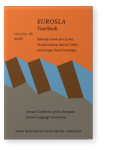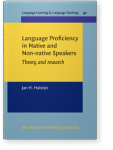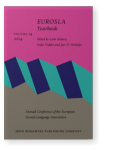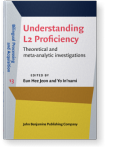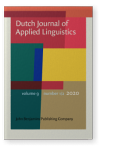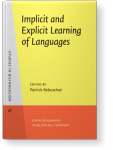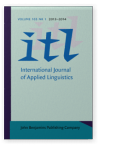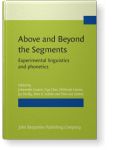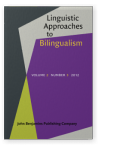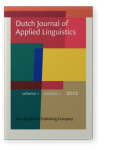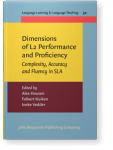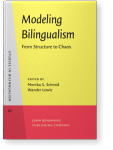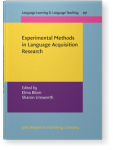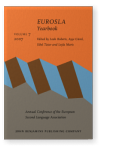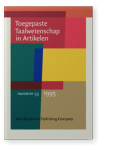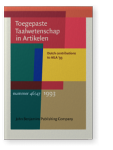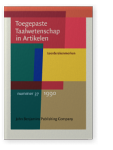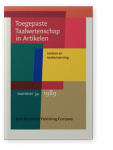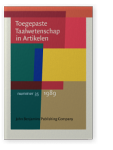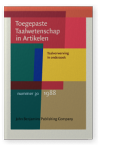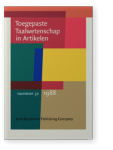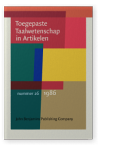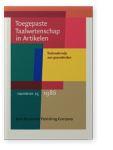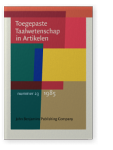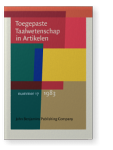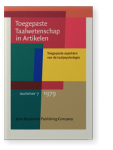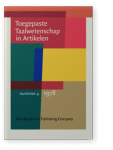Jan H. Hulstijn
List of John Benjamins publications for which Jan H. Hulstijn plays a role.
Yearbook
Titles
Language Proficiency in Native and Non-native Speakers: Theory and research
Jan H. Hulstijn
[Language Learning & Language Teaching, 41] 2015. xi, 195 pp.
Subjects Language acquisition | Language teaching | Multilingualism
EUROSLA Yearbook: Volume 14 (2014)
Edited by Leah Roberts, Ineke Vedder and Jan H. Hulstijn
[EUROSLA Yearbook, 14] 2014. x, 261 pp.
Subjects Applied linguistics | Language acquisition | Language teaching | Multilingualism
2022 Chapter 1. Introduction Understanding L2 Proficiency: Theoretical and meta-analytic investigations, Jeon, Eun Hee and Yo In'nami (eds.), pp. 1–4 | Chapter
2020 Proximate and ultimate explanations of individual differences in language use and language acquisition Dutch Journal of Applied Linguistics 9:1/2, pp. 21–37 | Article
I evaluate three schools in linguistics (structuralism; generative linguistics; usage based linguistics) from the perspective of Karl Popper’s critical rationalism. Theories (providing proximate explanations) may be falsified at some point in time. In contrast, metatheories, such as Darwin’s… read more
2015 Explaining phenomena of first and second language acquisition with the constructs of implicit and explicit learning: The virtues and pitfalls of a two-system view Implicit and Explicit Learning of Languages, Rebuschat, Patrick (ed.), pp. 25–46 | Article
This chapter examines to what extent Krashen’s (1981) distinction between acquired (implicit) and learned (explicit) knowledge can be upheld from a usage-based view on first and second language learning and in the light of recent advancement in (neuro)cognitive research on artificial grammar… read more
2014 The Common European Framework of Reference for Languages: A challenge for applied linguistics ITL - International Journal of Applied Linguistics 165:1, pp. 3–18 | Article
The Common European Framework of Reference for Languages (CEFR, Council of Europe, 2001) currently functions as an instrument for educational policy and practice. The view of language proficiency on which it is based and the six proficiency levels it defines lack empirical support from… read more
2014 The effects of age and level of education on the ability of adult native speakers of Dutch to segment speech into words Above and Beyond the Segments: Experimental linguistics and phonetics, Caspers, Johanneke, Yiya Chen, Willemijn Heeren, Jos Pacilly, Niels O. Schiller and Ellen van Zanten (eds.), pp. 152–164 | Article
This study tested Hulstijn’s (2011) hypothesis that adult native speakers share
the ability to process every-day speech, although older people do so more slowly
than younger people. In two segmentation tasks, segments of speech were
presented consisting of two to four highly common words. In the… read more
2012 Raadsels van tweedetaalverwerving Dutch Journal of Applied Linguistics 1:1, pp. 150–159 | Article
This paper predicts that the study of second language acquisition, as a young discipline of scientific inquiry in its own right, faces a bright future, but only if its scholarly community critically re-examines some notions and assumptions that have too long been taken for granted. First, it is… read more
2012 The effect of task complexity on functional adequacy, fluency and lexical diversity in speaking performances of native and non-native speakers Dimensions of L2 Performance and Proficiency: Complexity, Accuracy and Fluency in SLA, Housen, Alex, Folkert Kuiken and Ineke Vedder (eds.), pp. 121–142 | Article
This study investigated how task complexity affected native and non-native speakers’ speaking performance in terms of a measure of communicative success (functional adequacy), three types of fluency (breakdown fluency, speed fluency, and repair fluency), and lexical diversity. Participants (208… read more
2011 Explanations of associations between L1 and L2 literacy skills Modeling Bilingualism: From Structure to Chaos, Schmid, Monika S. and Wander Lowie (eds.), pp. 85–112 | Article
This paper reviews the results of 13 empirical studies investigating associations between L1 and L2 reading or writing skills, that were published after the reviews of Alderson (1984) and Cummins (1991a). Special attention is given to two large studies, in which the author was involved, that use… read more
2010 Chapter 9. Measuring second language proficiency Experimental Methods in Language Acquisition Research, Blom, Elma and Sharon Unsworth (eds.), pp. 185–200 | Chapter
2007 Fundamental issues in the study of second language acquisition EUROSLA Yearbook: Volume 7 (2007), Roberts, Leah, Ayşe Gürel, Sibel Tatar and Leyla Martı (eds.), pp. 191–203 | Article
The study of second language acquisition (SLA) forms a young academic discipline, emerging from fundamental paradigm shifts in SLA’s parent disciplines, linguistics and psychology. This paper gives a brief overview of how the study of SLA came into existence, formulates the fundamental questions… read more
1995 An Experimental Study on the Learning of Arbitrary and Non-Arbitrary Gender of Pseudo Dutch Nouns by Nonnative and Native Speakers of Dutch Toegepaste Taalwetenschap in Artikelen 53, pp. 121–136 | Article
In this article we addres the question of whether, and to what exetent, noun gender attribution in languages such as French, German and Dutch can be formulated in terms of - semantic morphonological rules - competing semantic and morphonological cues - arbitrary idiosyncratic features In addressing… read more
1990 Individuele Verschillen in Het Leren Van Talen: Ontwikkelingen in Theorievorming en Onderzoek Leerderskenmerken: Individuele verschillen in het leren van talen., pp. 5–14 | Article
This contribution gives a global introduction into recent developments in theory and research on individual differences in language learning. It attempts to outline a more general framework for the contributions in this volume on learner differences. The following five questions are focused upon:… read more
1989 Het Afleiden Van de Betekenis Van Vreemdtalige Woorden Uit de Context: Experimenteel Onderzoek Naar Het Effect Van Vier Vormen Van Steun Lexicon en taalverwerving, pp. 13–25 | Article
This research focused on the incidental learning of the meaning of new word forms occurring in a reading passage. In five experiments, a comparison was made of the retention effects of several ways to orient readers to the meaning of twelve new word forms ("targets"), occurring in a reading… read more
1989 It's so Difficult to Explain You Know Toegepaste Taalwetenschap in Artikelen 35, pp. 107–111 | Article
1988 Verwervingsvolgordes van Grammatische Structuren een Kritische Bespreking van de Theorie van Pienemann Taalverwerving in onderzoek, pp. 7–20 | Article
This paper critically examines Pienemann's theory of second-language acquisition orders. The paper raises methodological as well as theoretical issues: the validity of the acquisition order found by Clahsen, Meisel & Pienemann (1983), evidence for this order from longitudinal research, evidence… read more
1988 Verschillen In Taalvaardigheid: Taalachtergrond Of Sociaal Milieu. Toegepaste Taalwetenschap in Artikelen 32, pp. 145–147 | Article
1986 Van Input Naar Intake In Tweede-Taalverwervingsonderzoek Toegepaste Taalwetenschap in Artikelen 26, pp. 123–130 | Article
1986 Hoe Geef je het Goede Voorbeeld? Woordenschatuitbreiding Met Behulp van Voorbeeldzinnen Taalonderwijs aan gevorderden, pp. 118–128 | Article
Two investigations were carried out to estimate the usefulness of the context method for the explanation of word meanings. This method provides the L2 learner with a sample sentence for each target word, without translation into LI. A sample of 100 sentences was selected from a monolingual… read more
1985 Toegepaste Taalwetenschap Als Zelfstandige Discipline Toegepaste Taalwetenschap in Artikelen 23, pp. 112–118 | Article
1983 Componenten Van Tweede-Taalbeheersing Toegepaste Taalwetenschap in Artikelen 17, pp. 82–111 | Article
This study contains a reanalysis of some of the data collected by Cummins et al. (to appear), in their study of Japanese and Viet-namese immigrant students in Canada. The present study focusses on the English communicative test data elicited from 11 grade 2/3 and 11 grade 5/6 Japanese students who… read more
1979 Variabiliteit in Tussentaal Toegepaste aspekten van de taalpsychologie: 3 november 1979 te Nijmege, pp. 141–155 | Article
Starting-point for the two pilot studies reported here was the question whether systematicity in interlanguage is the same for different types of L2 behavior. We hypothesized that: 1. If L2 learners know the correct L2 rule they make more errors (deviations from that particular L2 rule) in an oral… read more
1978 Methodologische en Praktische Moeilijkheden bij Het Onderzoek Naar De Verwerving Van Het Nederlands Door Volwassen Buitenlanders Toegepaste Taalwetenschap in Artikelen 4, pp. 88–109 | Article
In the first and second section of this paper some methodological topics in the study of interlanguage (IL) and error analysis are discussed. The author adheres to Adjemian's point of view (1976): any interlanguage is a natural language and contains a linguistic system. Its systematicity is… read more
